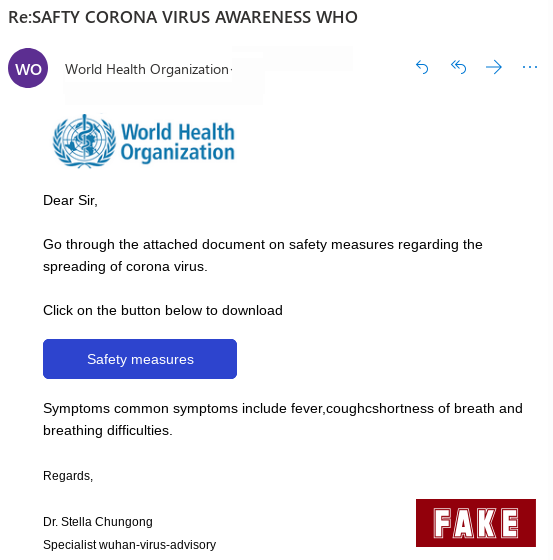The troubling detail discovered in email about coronavirus crisis
A troubling detail has been discovered in an email distributed to Australians regarding the global coronavirus crisis claiming to be from the World Health Organisation (WHO).
Red flags were set off after the email was detected by Sophos, a cyber security site, earlier in February as cases of the deadly virus escalated across the globe.
Along with a plethora of spelling mistakes, it featured a button labelled “safety measures” which directed users to a phishing website that displays the real WHO website home page.
However, an unassuming pop-up appears on top asking people to enter their personal information, including their email address and password.
These details can then be used by cyber criminals to steal the user's identity.

South Australia Police shared the dangerous scam in a warning to its Facebook on Thursday, encouraging the public to be extra wary when sifting for information on coronavirus.
“Take the time to think before following links or clicking on buttons contained within emails. Be open to the possibility that it could be a phishing or scam email,” their post read.
'Chernobyl moment': Warning to China as it battles deadly coronavirus spread
'We need to go': Menu detail 'scaring customers' amid coronavirus crisis
'We're in hell': Coronavirus fears for eight-month-old baby boy
It was not too difficult to identify something off about the particular email, which was littered with spelling and grammar errors.
The subject line read: “Safty corona virus awareness WHO”, with the body of the email carrying the official logo of the organisation.
“Go through the attached document on safety measures regarding the spreading of corona virus. Click on the button below to download. Symptoms common symptoms include fever,coughcshortness of breath and breathing difficulties,” the email read.

“Regards, Dr Stella Chungong. Specialist-wuhan-advisory.”
Fortunately, most fluent English speakers would be able to spot the mistakes and therefore won’t click on the dangerous link.
Scammers will often try to commit identity theft by obtaining sensitive, private information such as usernames, passwords, and credit card details, by disguising the attempt in a manner that appears to be from a trustworthy entity, the police said.
“Phishing emails often contain spelling and grammatical mistakes which would not be expected from the organisation from which the email was supposedly sent.”
Do you have a story tip? Email: newsroomau@yahoonews.com.
You can also follow us on Facebook, Instagram and Twitter and download the Yahoo News app from the App Store or Google Play.



